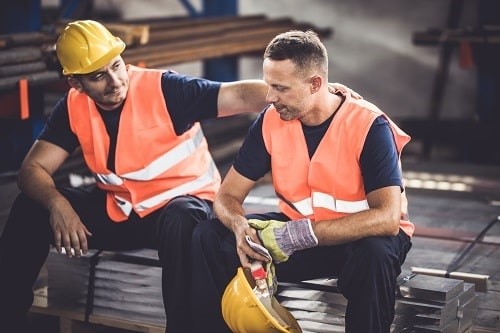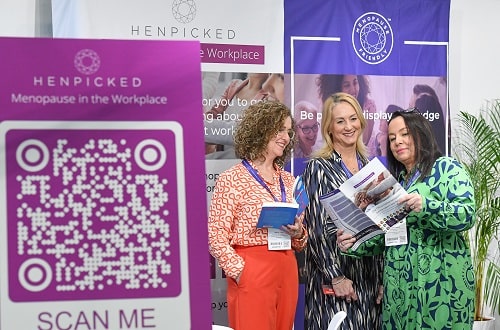When Mates in Mind was founded in 2016, it was evident that the workers in the construction industry were experiencing a greater-than-usual risk of suicide, while stress and depression were cited as some of the causes.
Features
Caring for head and mind
Statistics from different sources showed such a scenario; the word-of-mouth evidence among those in the know also confirmed it.
Data published by the Office for National Statistics in 2017, a year later, stated that males working in low-skilled occupations, such as labourers, had a 44 per cent higher risk of suicide than the male national average; the risk among males in skilled trades was 35 per cent higher.
It also showed that among males working in skilled trades, the highest risk was for those working in building finishing trades; particularly, plasterers, painters and decorators, who had more than double the risk of suicide than the national average for males.
Lower pay, more job insecurity, less control over their work patterns than higher-skilled workers, working remotely and at a distance from a family and support network for long periods while on the job are some of the reasons that usually help to explain such figures.
 Men working in low-skilled occupations, such as labourers, have a 44 per cent higher risk of suicide than the male national average according to the ONS
Men working in low-skilled occupations, such as labourers, have a 44 per cent higher risk of suicide than the male national average according to the ONS
During the past three years, Mates in Mind not only has been a recognised player creating awareness of the prevalence of mental health issues in the construction industry and a respectful voice in the national debate about mental health in the country but, crucially, Mates has been able to build a network of supporters, reaching hundreds of organisations and thousands of people in the industry with its message and recommendations.
As this issue of Safety Management discusses other risks in the construction industry, such as working at height and the need to protect the head from physical injury, James Rudoni, managing director of Mates in Mind, tells us about the need to look after our mind as well.
JR: I would say that during the past three years, the construction industry has made good progress in recognising there is a problem, and making advances to address the stigma around poor mental health. Some of our supporters are already reporting a positive measurable impact on the mental wellbeing and engagement of their employees. However, there is much more work to do, especially in putting in place preventative measures and reaching further down the supply chain to those small companies and sole traders.
 James Rudoni: "Some of our supporters are already reporting a positive measurable impact on the mental wellbeing and engagement of their employees."
James Rudoni: "Some of our supporters are already reporting a positive measurable impact on the mental wellbeing and engagement of their employees."
IC: Mates in Mind offers several training courses and resources for organisations to help them address the issues related to mental health. When asked which of these initiatives and tools are the most successful, he cautiously replies:
JR: There is no one solution that works best. It has more to do with the ‘whole organisation’ approach towards making a lasting change through a more tailored programme. However, as a minimum, we would recommend that every employee has some basic level of mental health awareness via our ‘Start the Conversation’ awareness training which is included in our Supporter subscription.
IC: In 2017, there were an estimated 16,000 work-related cases of stress, depression or anxiety (new or long-standing), a quarter of all ill health in this sector, according to the Office for National Statistics. At the time, Mates in Mind had an ambitious goal – to reach 100,000 workers in the first year and influence 75 per cent of the construction industry by 2025. Are you going to fulfil this expectation?
JR: We are now working with over 350 organisations with more than 250,000 employees. Our model of support is about enabling organisations and giving them the tools to not only embed a positive mental health environment in their own workplace, but also deliver awareness and training down through their own supply chain. This extended reach, coupled with our other awareness-driving charitable work across the sector, will ensure we reach our target and beyond.
IC: If you had to summarise the most positive experience working with the construction industry, what would it be?
JR: Our recent education work with apprentices was encouraging and hugely positive, and showed that 90 per cent left with a better understanding of mental health and 83 per cent felt they could spot the signs of poor mental health in someone else. Embedding this positive attitude in the next generation entering the construction sector is an important step to creating a truly positive culture around mental health.
IC: What do you think has been Mates in Mind biggest impact so far?
JR: I have heard from individuals that have said that the work of Mates in Mind has enabled them to speak to a colleague who they identified as someone who may be struggling with their mental health. The person struggling later said that his intervention has prevented them from harming themselves. This direct, potentially life-saving impact on a single person’s life is what makes Mates in Mind such a great charity.
Find out more at Mates in Mind: www.matesinmind.org
FEATURES

Why line managers play a vital role in workplace wellbeing
By Marcus Herbert, British Safety Council on 03 September 2023
The behaviours of line managers can have a positive or negative impact on employee health, wellbeing and engagement, so it’s vital managers get staff feedback on whether their management style is supportive or negative, and have regular check-ins so workers can raise concerns about their wellbeing.

Watercooler Event to hone in on eight trends in employee health and wellbeing
By Claire Farrow, Make a Difference Events & Media on 15 April 2024
The free-to-attend Water Cooler Event at ExCeL London on 23–24 April will see more than 6,000 workplace experts coming together to explore the latest thinking, solutions and best practice for supporting and boosting employee wellbeing, diversity and workplace culture.

Sedentary working and how to combat the ‘sitting disease’
By Gavin Bradley, Active Working on 05 April 2024
Prolonged and excessive sitting poses a major risk to our health, but the Get Britain Standing campaign and On Your Feet Britain Day on 25 April are a great way of encouraging workers to sit less and move more.



